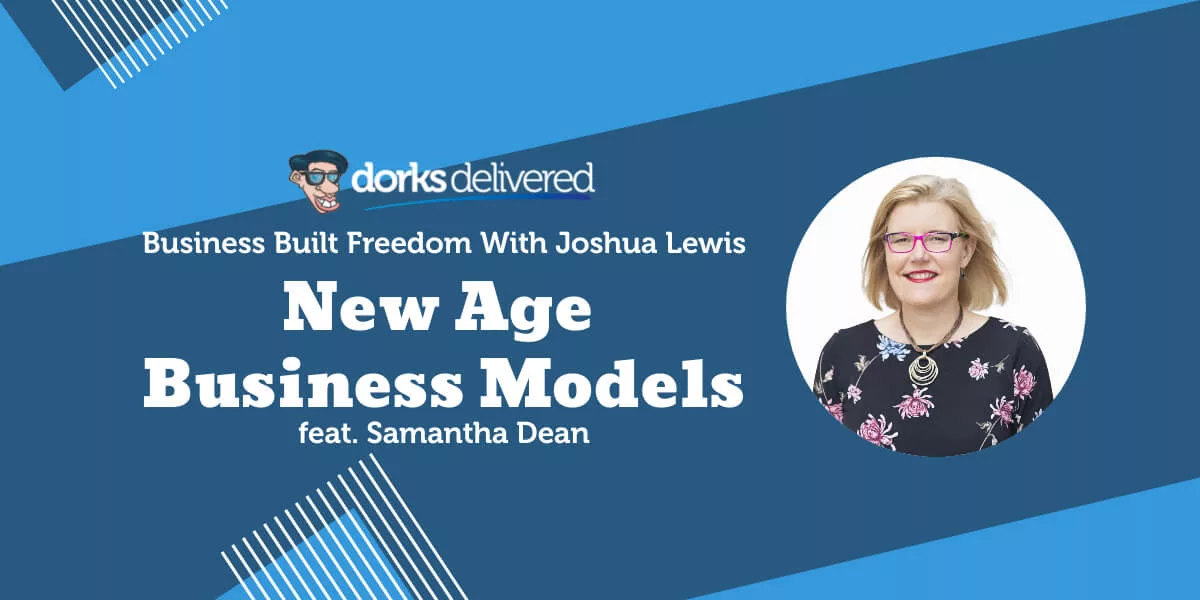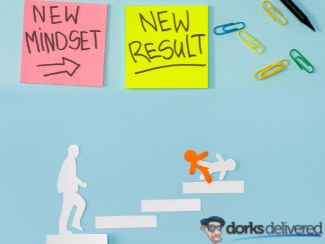There are so many ways to run a business, and there may be other ways to do it that you’ve never thought about before. Samantha Dean from BlueprintHQ tells us more about the innovative revenue model.
What Are Innovative Revenue Models
An innovative model is very dependent on what you want, and I think this links straight back to your podcast: Business Built Freedom.
Traditionally, we go into business for ourselves or one that’s built around our expertise. We don’t then look at moving forward, instead we kind of look back to how everyone else has done it.
It’s shifting towards what success means to you—not what success should be—and towards building a habitat in your business that links all the way from your vision based on what you want to the financial statements, leadership, people, process, and systems that you want. The next part of that is enveloping that in core values, safety, and accountability.
The main issue around this structure is that we have not been taught how to do any of that. We’ve been taught how to maybe do our product and financial statements, but we haven’t been able to talk about how to run a business. It takes seven or eight minutes to open up a business. Most of us spent years getting qualifications, I spent a decade learning how to be an accountant, but it did not teach me how to run a business.
It’s something that should be taught more at school and as a career. I am guilty of it. I’ve been a cowboy trying to work out how to get to where I’m at. I’ve learnt by touching fire, most of the time realising that’s not a good idea.
That’s the problem. As technicians and as experts, we are taught not to make mistakes, but if you’re building a business, you must make mistakes and you must make it safe to make them.
Failure leads to success. If you don’t have any failure, you won’t have success. If you’re mining, it’s very unlikely you’re going to strike gold the first time you hit the ground.
Leadership Is the Most Important Part of Any Business
We mainly work around experts and dollar businesses that have products or services that are very much needed, like IT. The problem is they’re built around one person, and then we don’t even know how to look after ourselves.
If you’re building any kind of business, the leader is the most important person, but the leader tends to come last a lot of times. First, you have to learn people skills. I know this because I’ve made so many mistakes. The good thing is I’ve learnt from those mistakes. I’m a very curious person by nature and I always ask myself “how can I make that better?”
It wasn’t until very recently I realised that if I’d look after myself, then my people and everything will follow. That was a big learning experience.
For me, it’s to stop people who want to change—those who understand that it will take some changes and show that they have to change behaviour and skills to go forward. We think that we can just continue doing things the same way and then we can make those $ 2 million dollars.
Particularly in the expert style of businesses, we’ve got spreadsheets. I don’t know how many spreadsheets that would say I would take this from here to here, and then you get to the end of the year and wonder why that didn’t happen. It’s because you have to make it happen and you must have skills and you must bring your team on board too. Nothing leverages a business faster than all in with your people.
Are you looking for ways to be more efficient? Talk to us!
Safety, Trust, and Collaboration
We must learn how to make collaborative spaces. We have to learn how to trust. And the biggest thing to trust is to create safety.
You have to create safety to make mistakes, and I’m not talking about doing three times the wrong way—that’s slackness. What I’m talking about is going and experimenting, rewarding that and finding ways to measure it. Say, “we’re here and we want you to make mistakes,” but you have to send rules and boundaries around that and then demonstrate it.
The biggest thing about leadership is leading by example. You do not get your team to do something that you’re not willing to do yourself or you haven’t done yourself. If you want your team to go on a high-level change, be ready to change.
I think this is the biggest mistake I made, particularly when I was in a very large accounting firm. I was trying to change, but a lot of our leaders did not. A lot of the business structures that we have now are not built for that. They’re built on expertise and ego and everything else. We started shifting this, and I’m on a journey to find out how to do that. There isn’t a lot of instruction on this, but there are ways to have safe conversations and communication.
Building Relationships Toward a Heart-Centred Business
If you look at what’s happening in the thought leadership area around this—the ones I follow are Bernie Brown, Simon Sinek, and Jim Collins—they’re all talking about heart-centred businesses into the future and how we shifted from muscle-style businesses to the industrial age type of businesses to brain-style businesses, such as IT and accounting.
We have to build relationships, but no one teaches us how to build relationships and how to build community. Businesses need to be safe, and by safe, I mean you can come in and bring your problems to work. There’s a framework for you to have a conversation, such as if you’re having a bad day, and someone else will pick it up for you.
How to Quantify Value
In order to quantify value, we have to acknowledge it. When I say success on your own terms, the concentration is I want to make money. There’s no question about that. You need to make money so you can empower other people. Your profit and loss should be how much can I help and pay my staff and my family, and then your balance sheet should be what’s my worth and what’s my value, my asset value and cash flows, how you fund it. Surely you need to concentrate there.
But you also need to say what success looks like and how I’m feeling, how I’m working, and how my staff are feeling. If you concentrate on that, I can guarantee counterintuitively the money actually follows. It follows where the good energy is.
Listen to Finding Your Passion With Joshua Lewis
Owner Alliance and Valuation
I started this work really early on when I used to do a lot of business valuation work. The biggest thing that would hit a valuation faster than anything is owner alliance, and most businesses up to the $10 million mark have a massive owner alliance issue. Now, that issue does hit you on the valuation.
If you’ve got somebody who the business is relying on, not just from a technical point of view but also from their mind they’re not sharing, the valuation goes. What is interesting as you look forward now is those people are burning out. They’re dying early. It’s a health issue as well, and you’ve got to think why.
If you want to be a control freak—and that’s okay—and you want to build a small business that makes lots of money, you can do that, too. The model of your business just needs to be built on what you want. So if you want control—although there is no such thing as control—or if you want that or you want the perception of it, build a model that suits you.
This is the problem. We should have these big growth businesses. We should have a model. We should have an online model or whatever model. Don’t get too stuck on that. Ask: What do I need? How can I explore that and find that?
If you want a business that’s small where you control all aspects of it, you can still make quite a good coin out of that. It’s just that your systems and processes and everything will need to be worked on.
We often go, “we’ve got to go.” Sometimes, the growth you need is internal as opposed to external. It’s very hard to say this will be the model of the future. I think the business models of the future are going to be very much based on the humans who run them.
How do you deal with the stress of running a business? You may also like “How to Inspire Wellness With Karen Pyke“
The Transformative Business Model

We work with a lot of businesses, and we start where you’re at right now and we will have a look at it. We always start with that process of finding out where you want to be personally as the leader because the business does not disconnect from the person.
About 10 years ago, I didn’t get that. You do not become a new individual when you walk through the doors of your office, and you certainly don’t become a new person when you walk through the doors of your home.
If you’re dragging shit around with you, you’re going to drag it all over so it’s most important that you are happy and that you find joy in what you do every day. We need to start there, and then we build around that and we see where the next rock needs to go. Usually, it’s around staff and starting to talk collaboratively with staff and then the changing skill sets.
Once you get the staff going and they’re coming up, then if you are still using fax machines, then your staff will tell you, they will then take it, and they will empower it. If you hear me say we need to start working on systems, processes, people, financial statements, the first thing it probably would cause is absolute fatigue. We’ve got to start undoing that first and then you’ve got to bring other people on board.
Create a Collaborative Space
Samantha: If you’re a small business, that might not mean employees. Some of the business models of the future that we’re working with are collaborative. So how do you work with the people around you? How do you work with your clients? How do you actually look at what your clients do and can they help you with it? But the first start to anything is what the hell do you want? Not many people ask that question.
Do you want to turn your IT into a utility? Contact us!
Finding Your Why Is Hard but Worthwhile
When you’re looking at that, one reason it’s so uncomfortable to do is quite often people come up with something that is what they want, but not what they should want. If you’ve worked in a business for 20 years and you realise that your passion is being creative and finding change for people, it’s hard when you’re in that. My passion, my why, never changed.
The first time I saw Simon Sinek on TED Talks, I wanted to make sure that people do not compromise their personal goals for business ones. It makes decision-making efficient. Every decision you make from then on is around that. So, you’re an efficiency expert and if you know where you want to go and you don’t even know how to get there, that puts you on a longer path.
The other efficiency thing is we teach a lot, so getting people around you who are on your Why saves not just time but also a whole lot of energy.
Finding your why is hard. No one is saying that it’s easy. It took you a long time. It’s taken me a long time. But there is a process that you can go through.
About BlueprintHQ
I love talking to people and really connecting to see if we can help. Worst case scenario, on that call, I’ll give you some tips and tricks and give you value that’s so important to us. I just
love talking to people. It’s one of my passions in life. My husband and my kids hate it because I’ll go into a cafe and I’ll talk to anybody.
We have a podcast called Business Habitat. I would love for you to have a bit of a listen. We talk about this stuff all the time. We get a lot more into the behavioural issues and what needs to shift. We have interesting people who have built businesses that are different from the normal.
Jump onto our website and hit the free consultation. You can book a meeting with me for about 20 minutes.
Turn your IT into a utility and have more time in your hands. Check out the Dollar IT Club or call 07 3166 5465 to learn more.
[module-379]






























